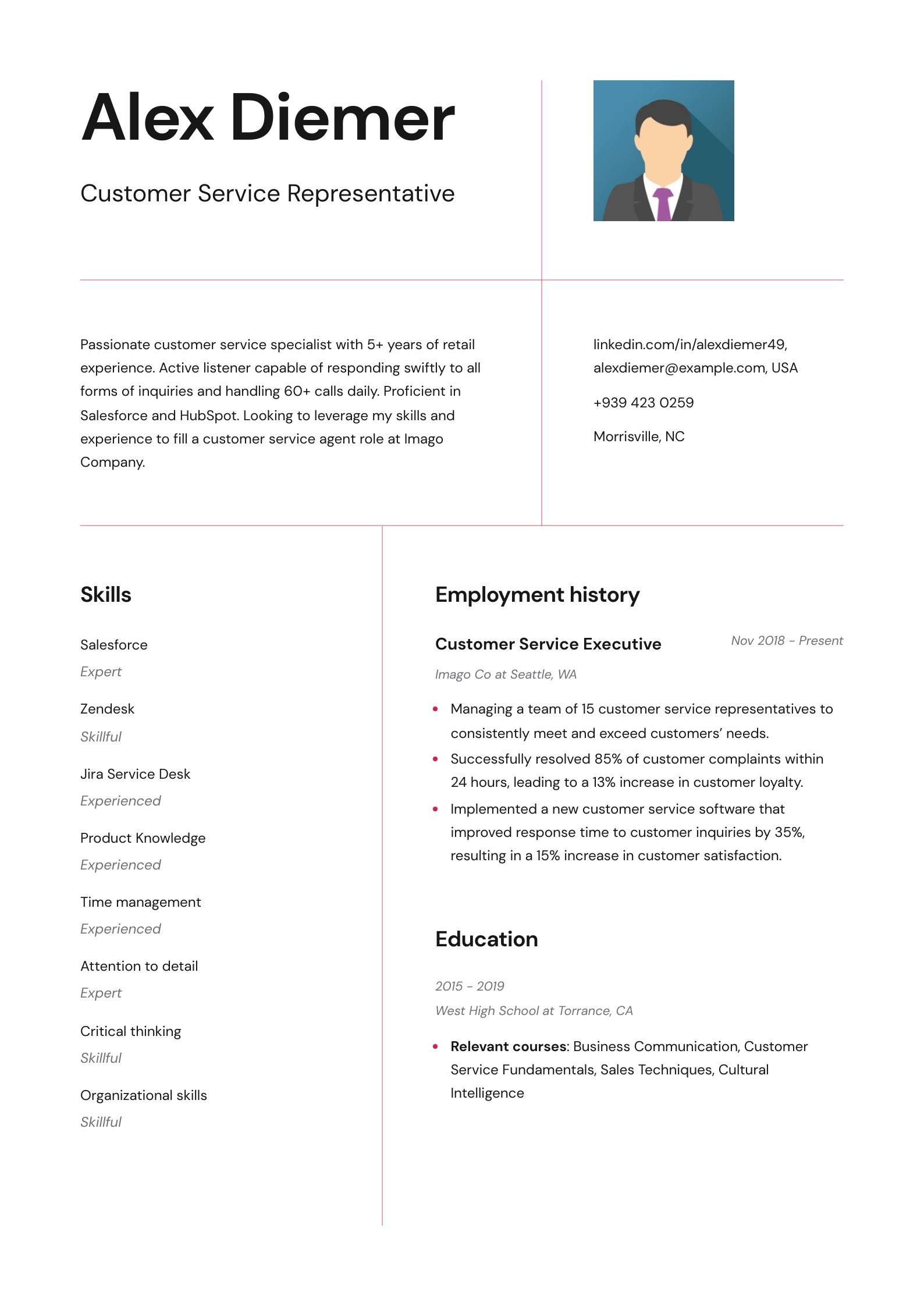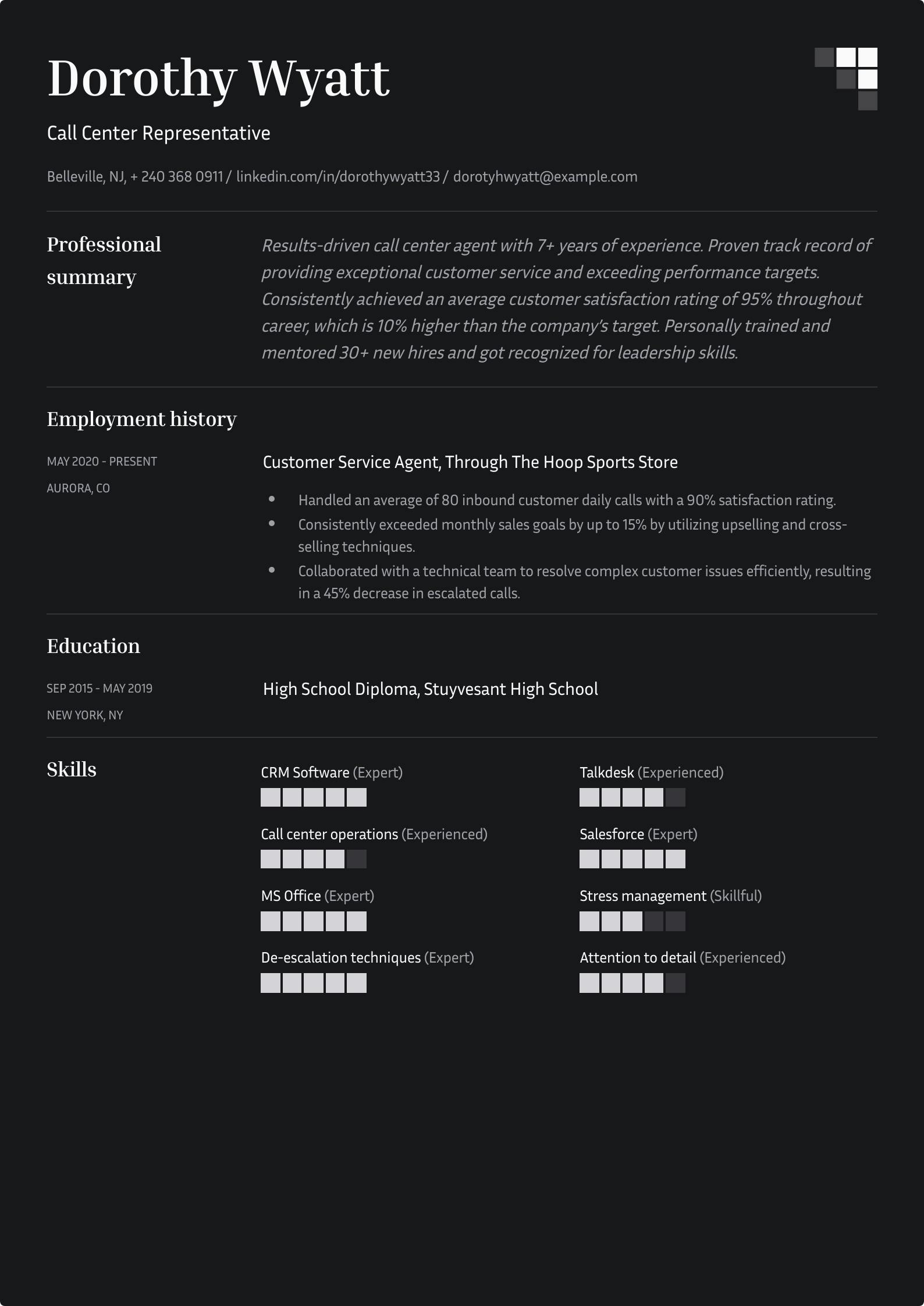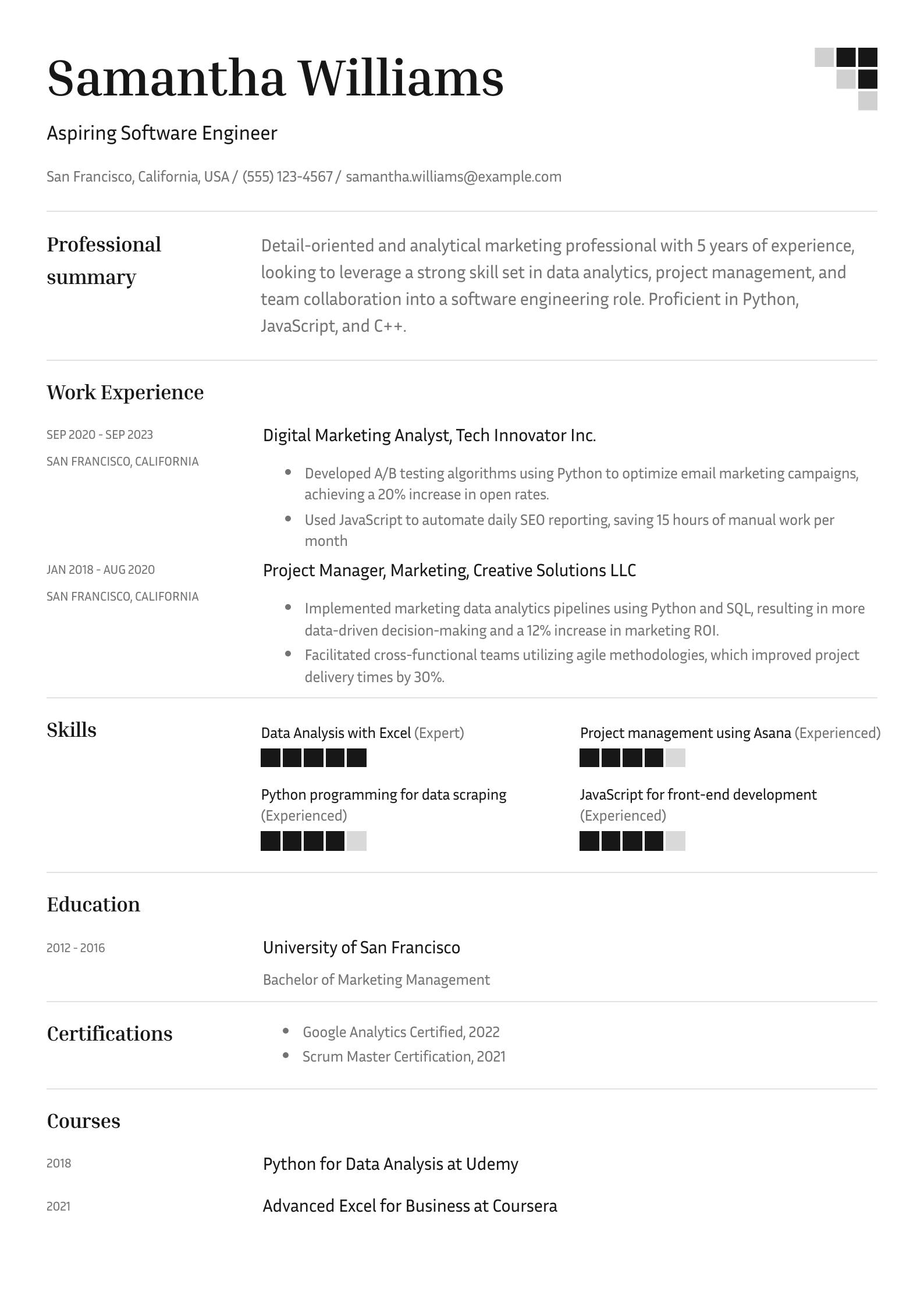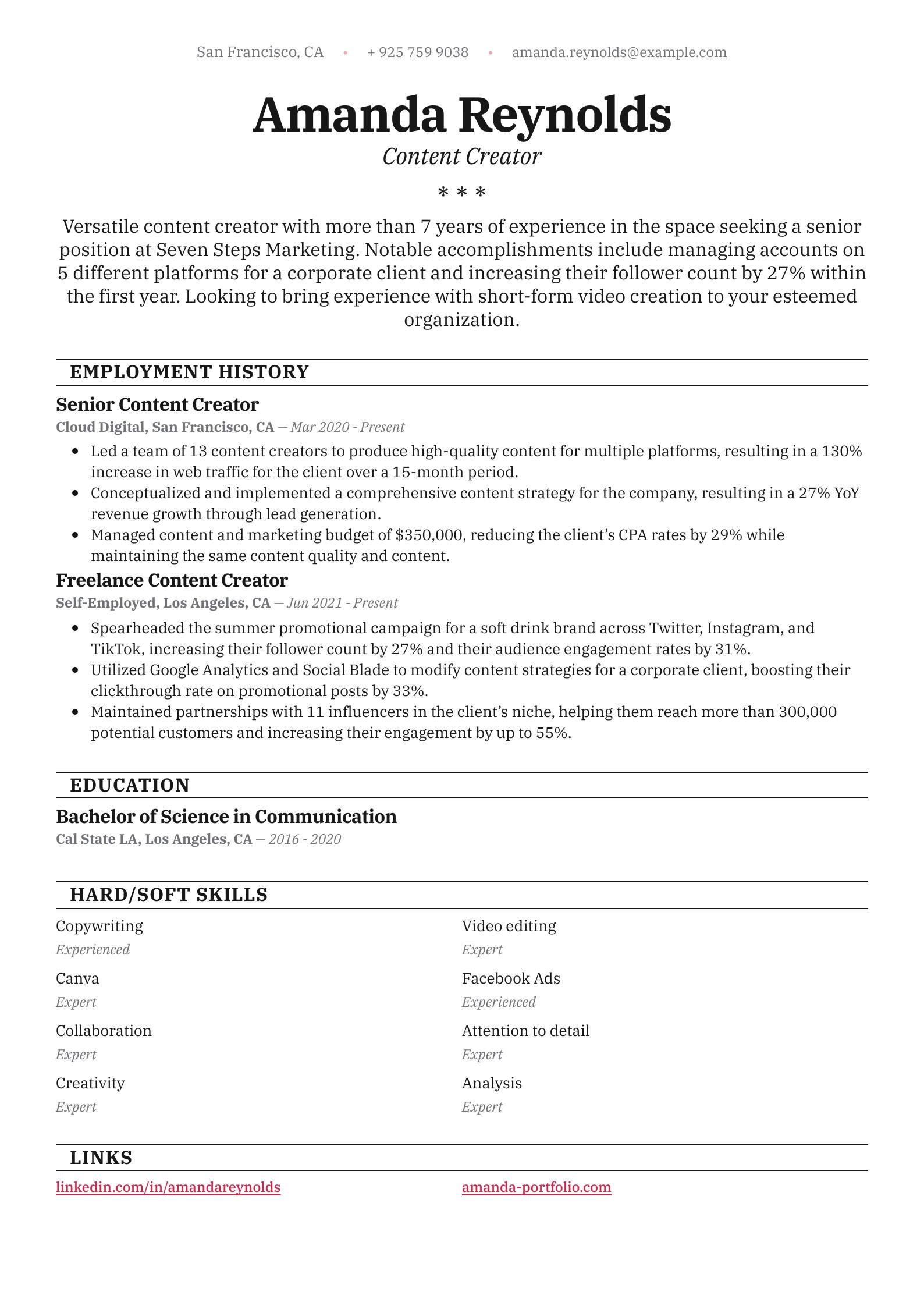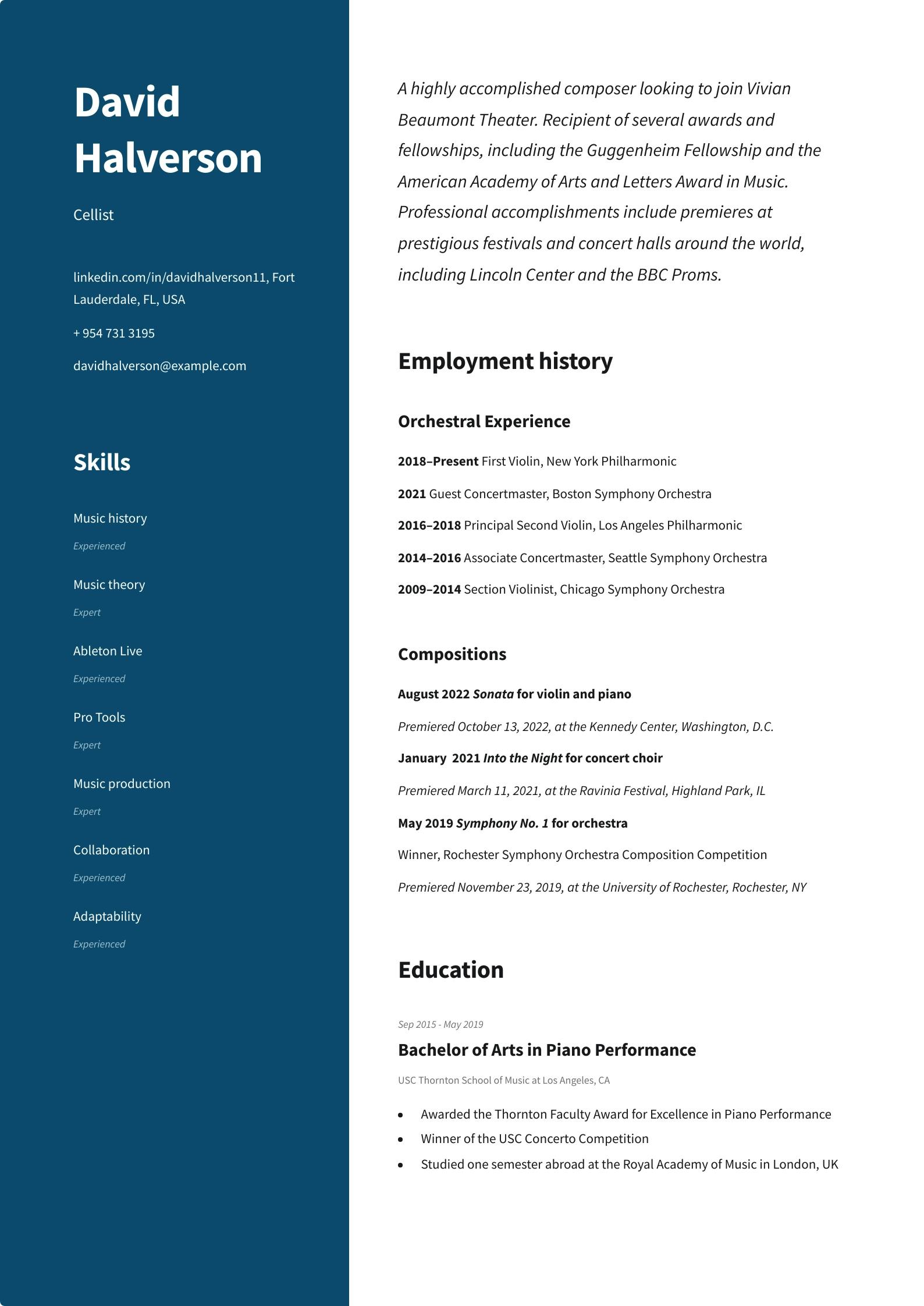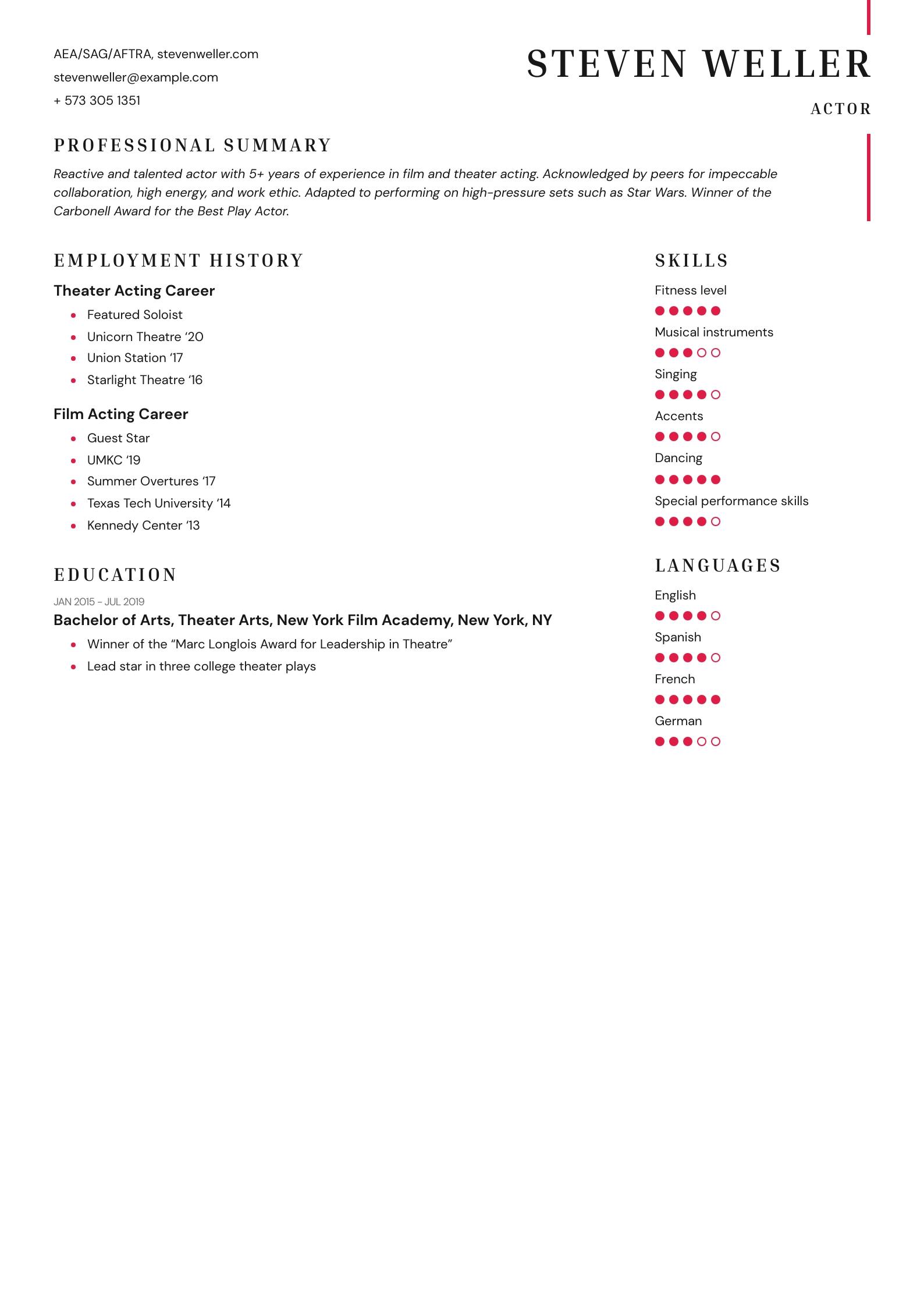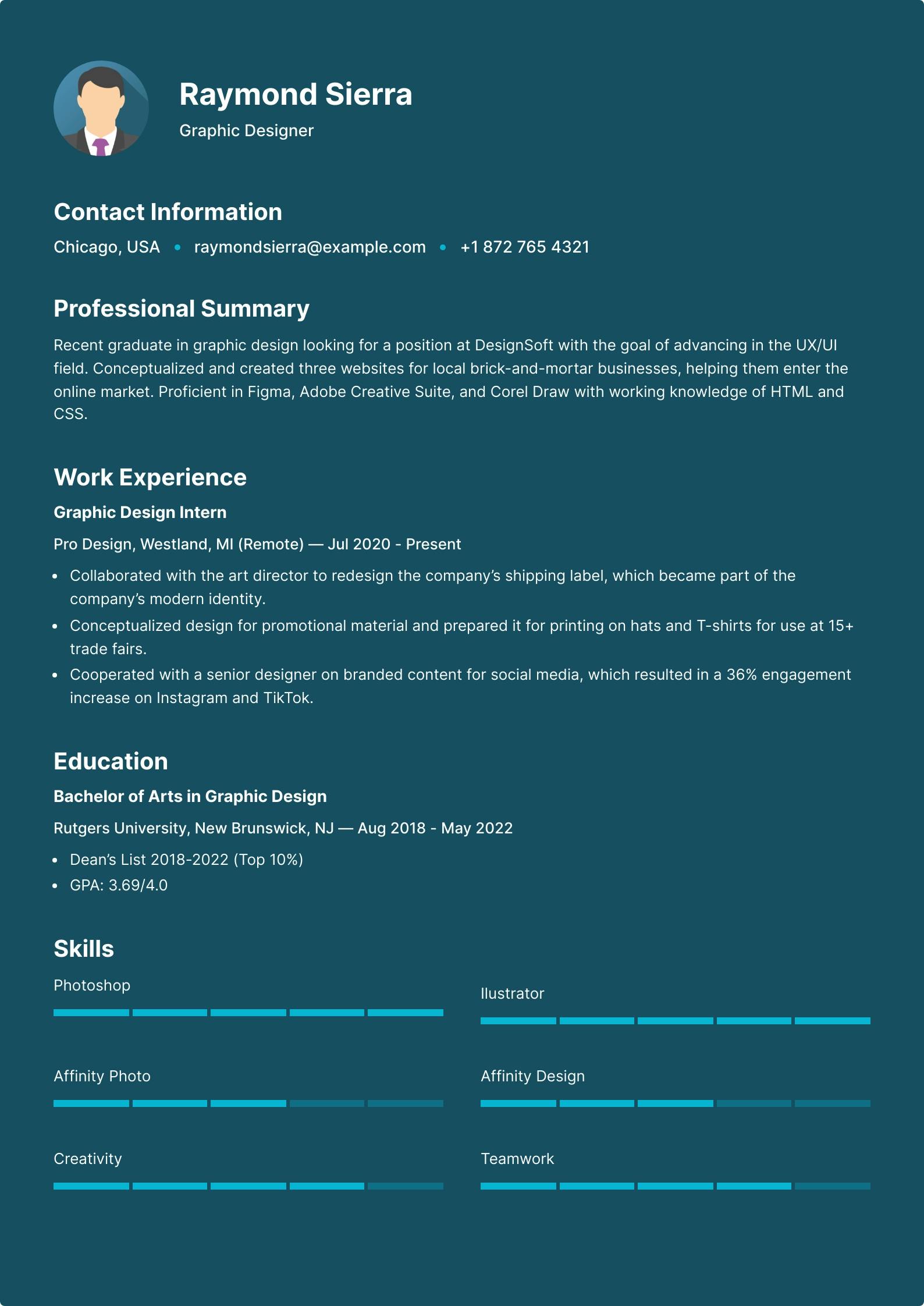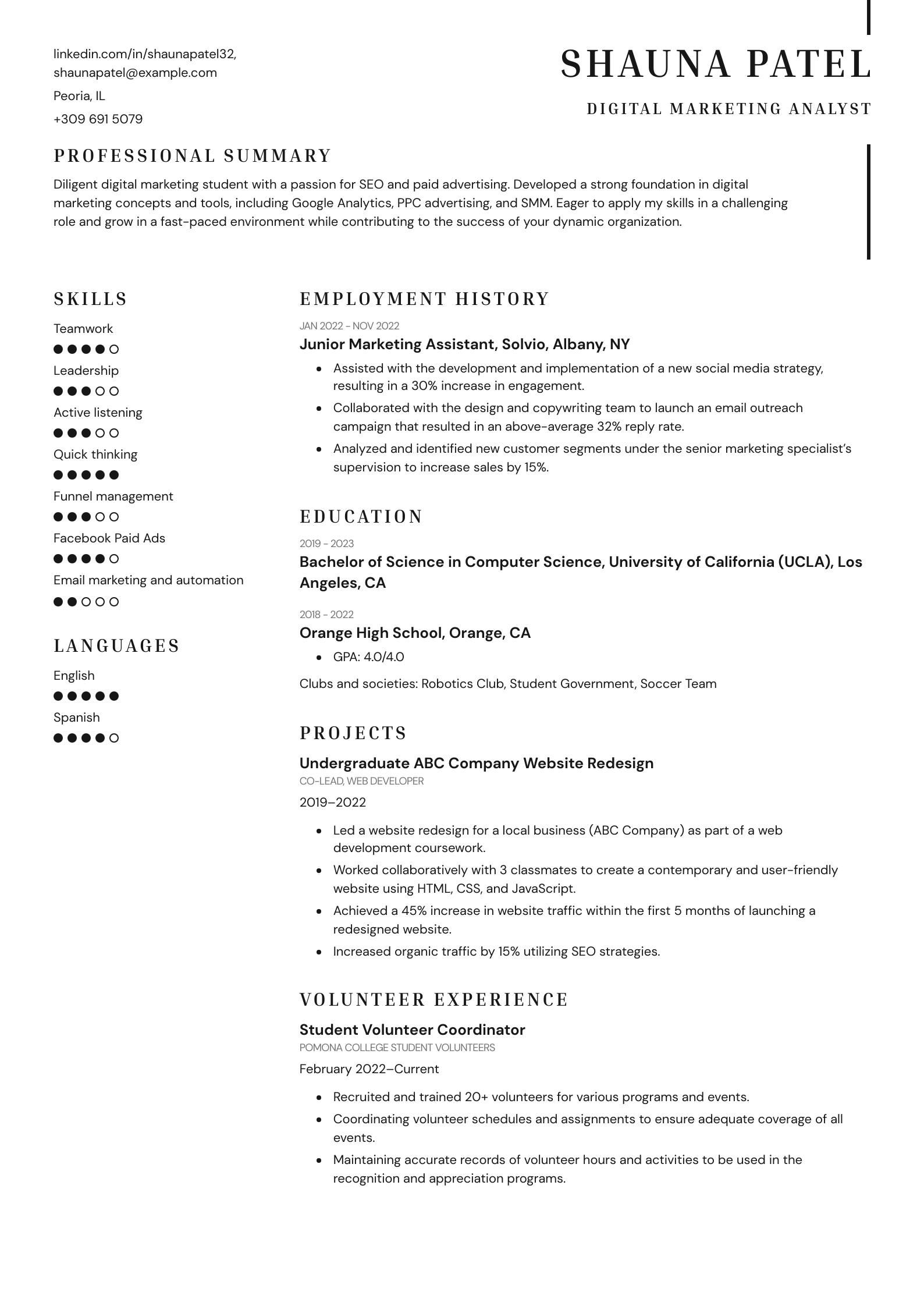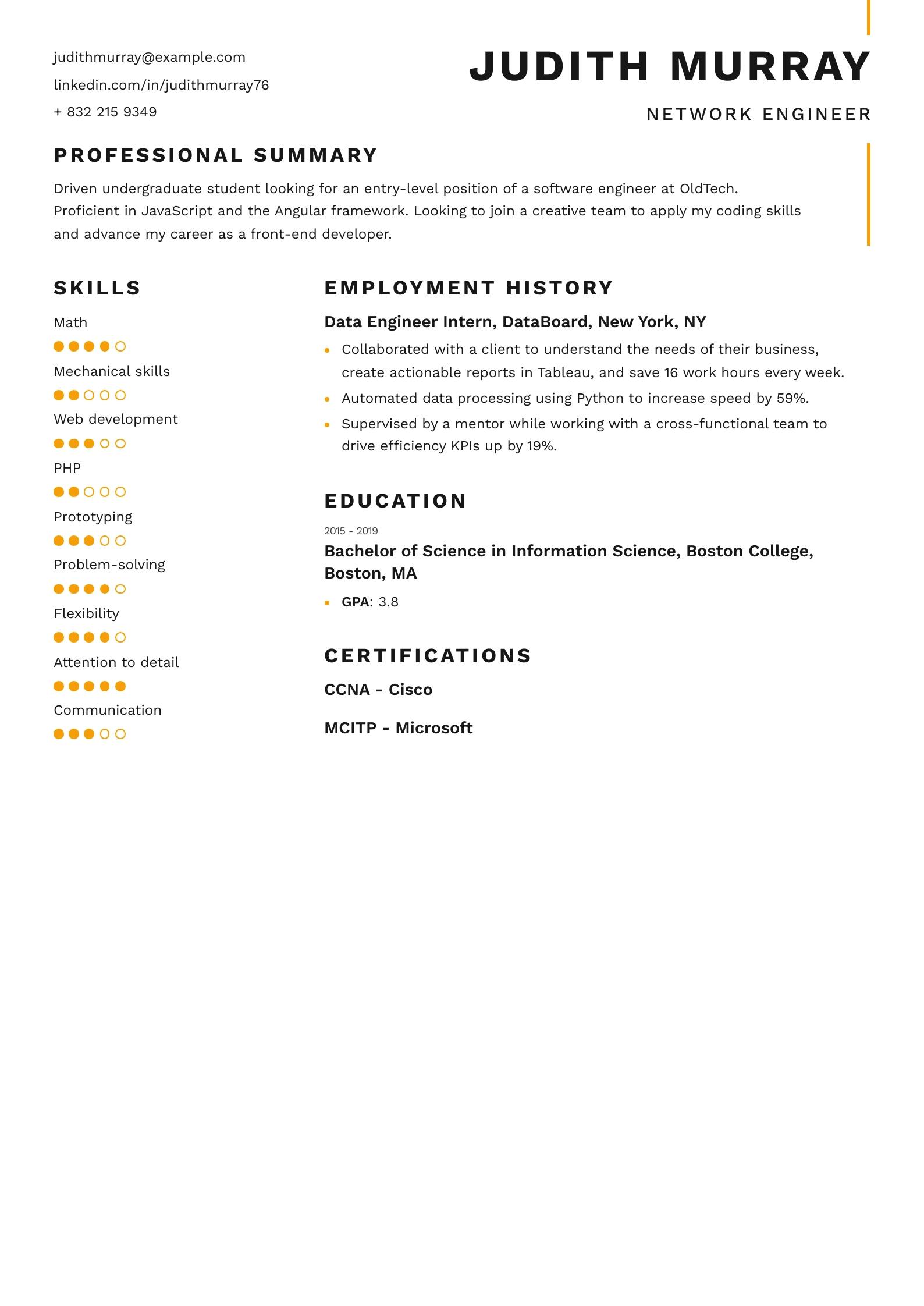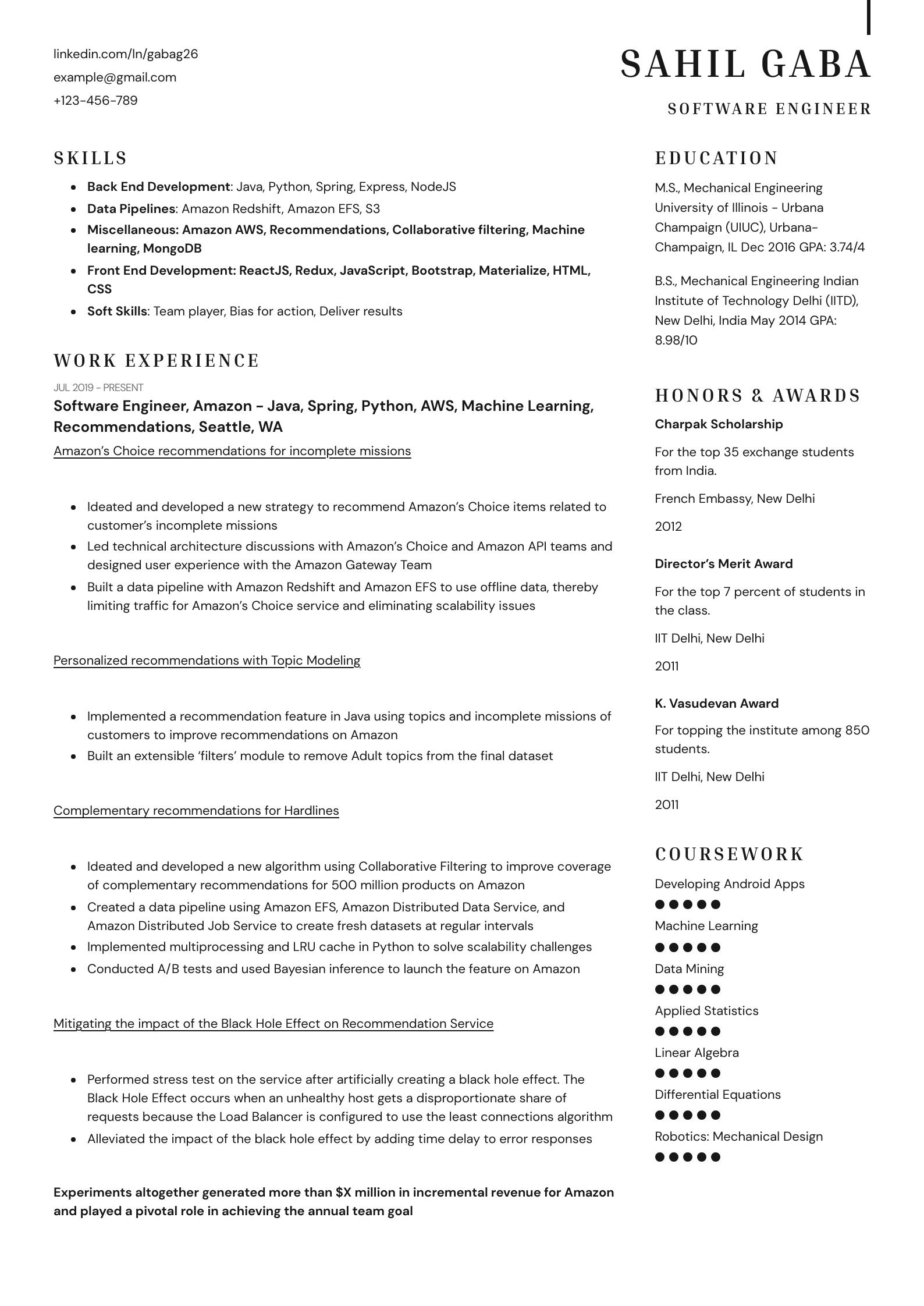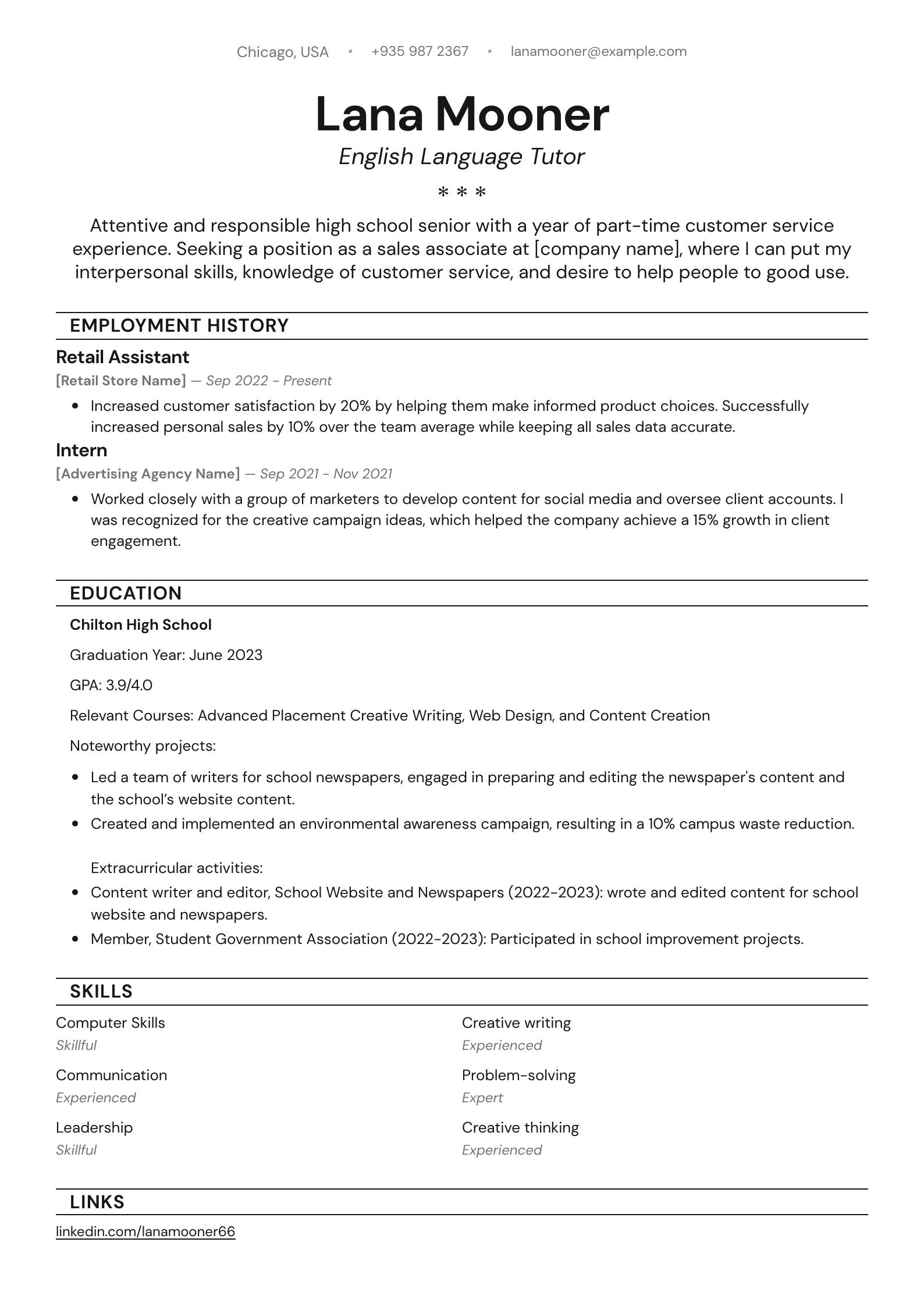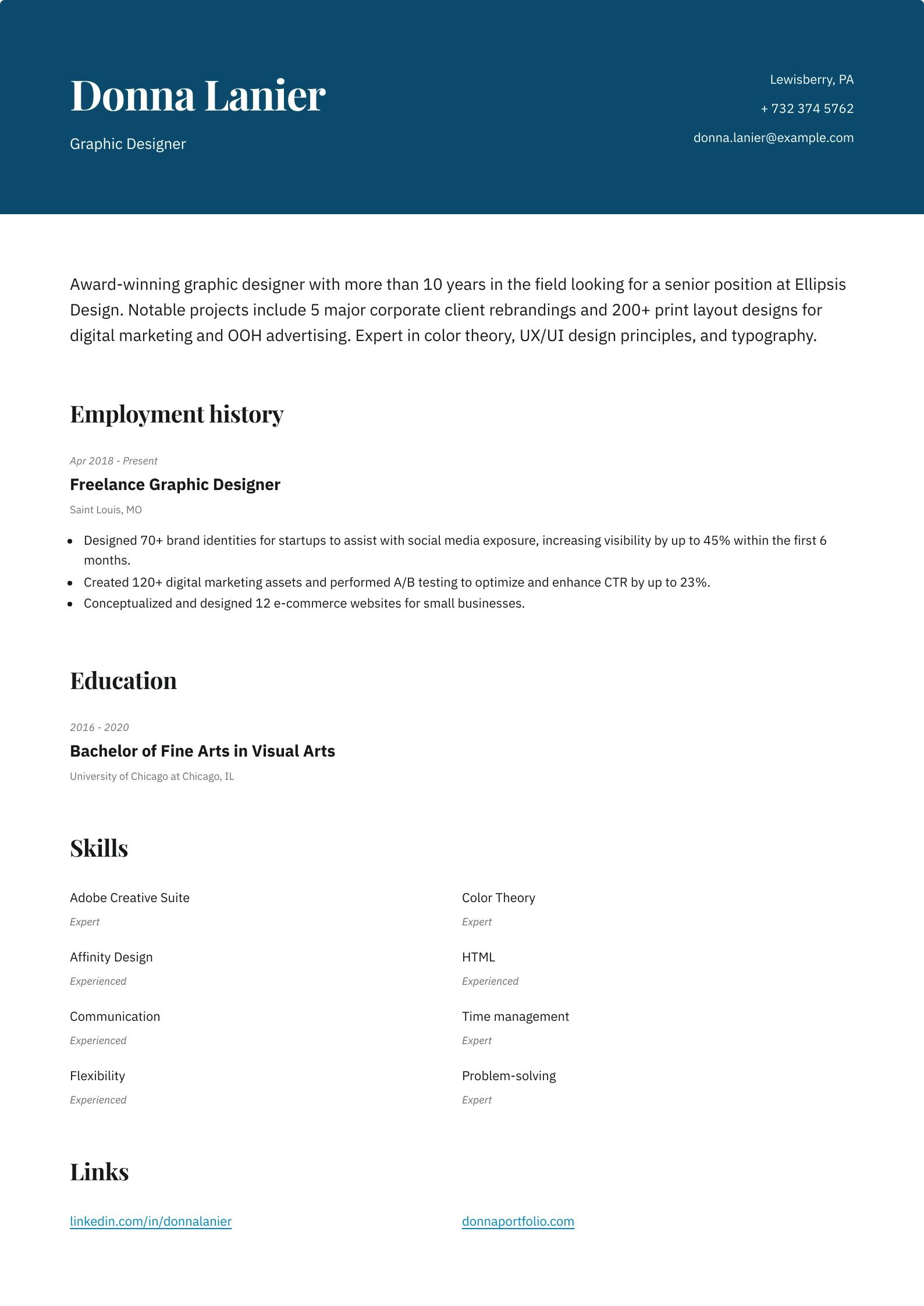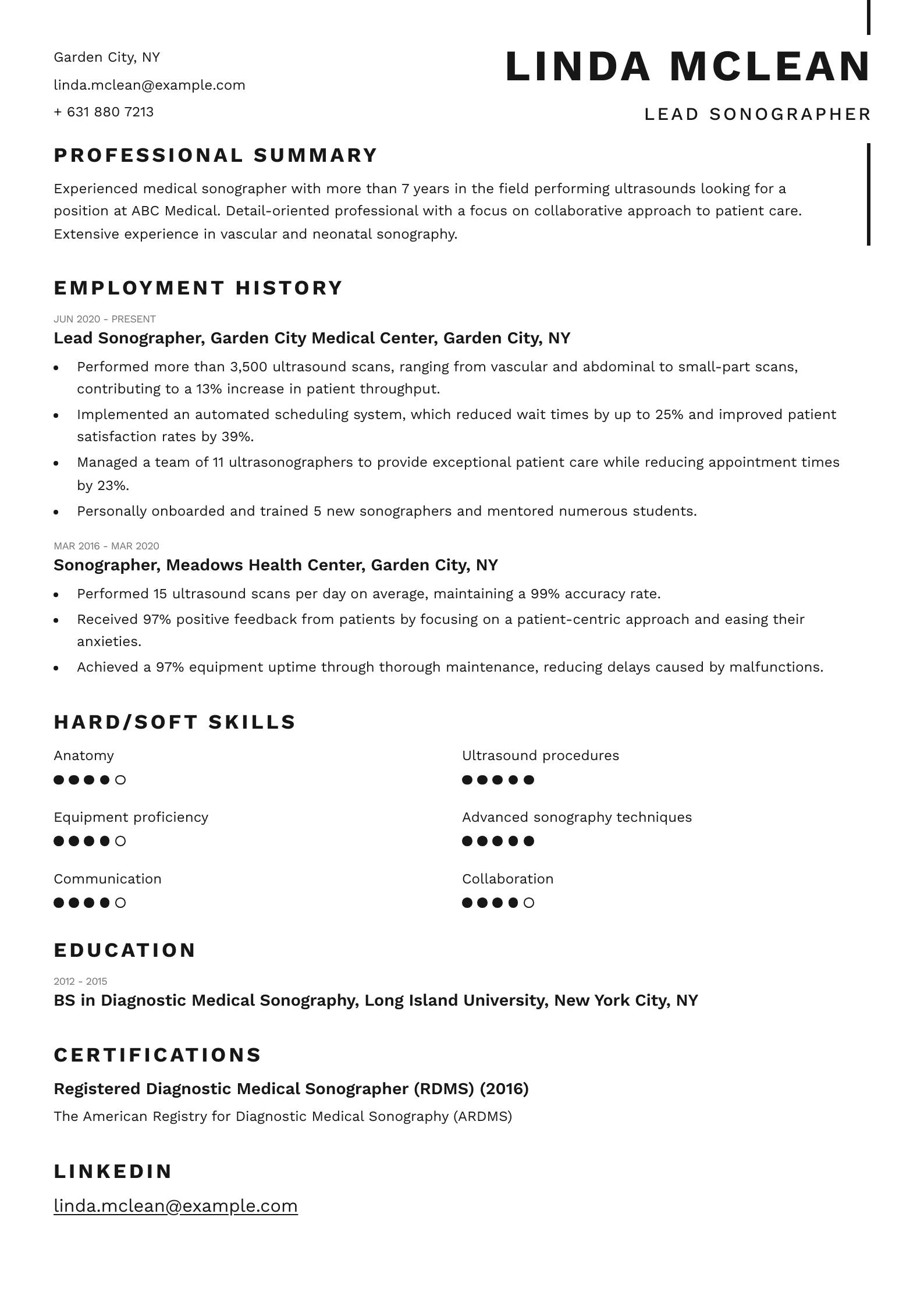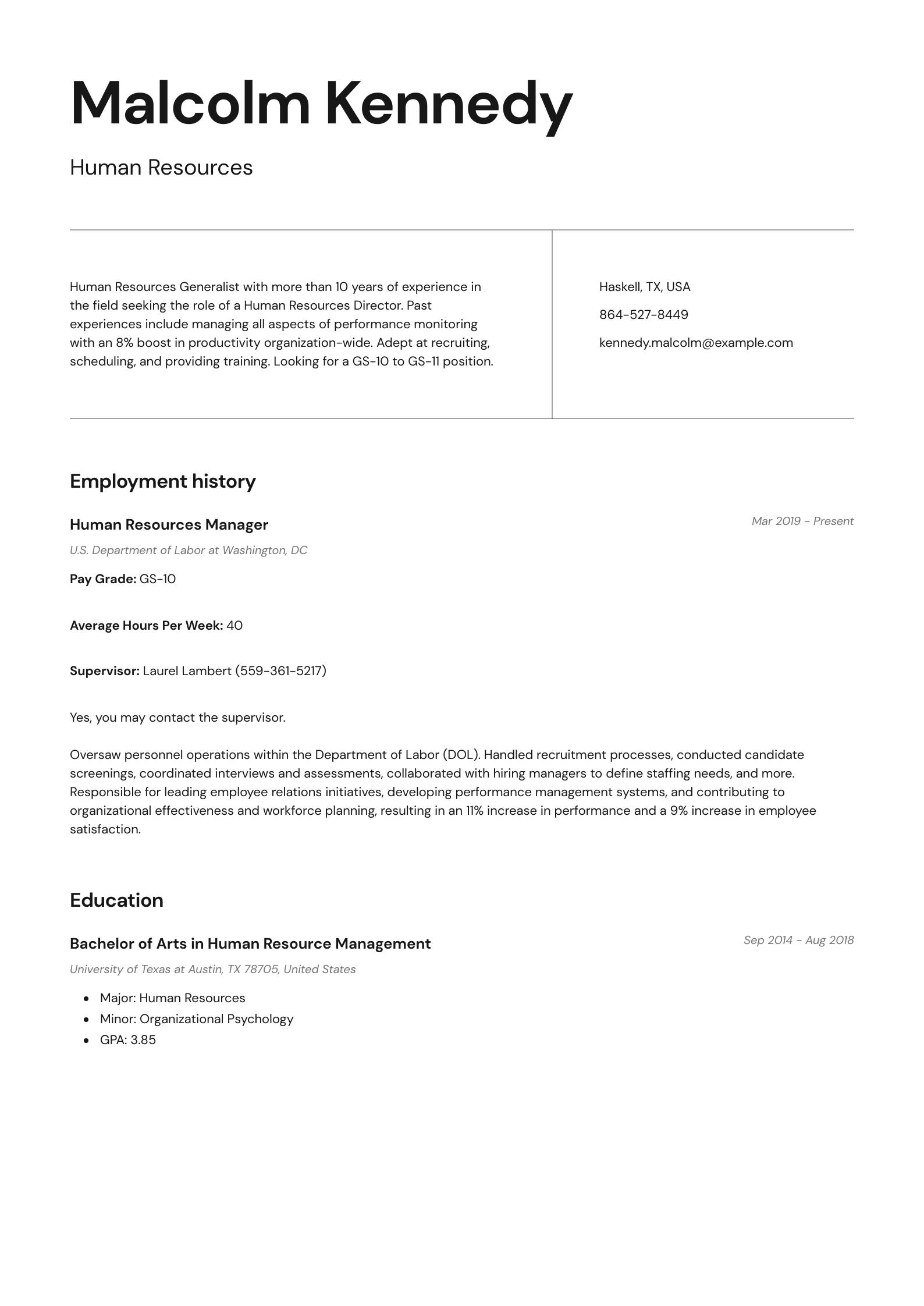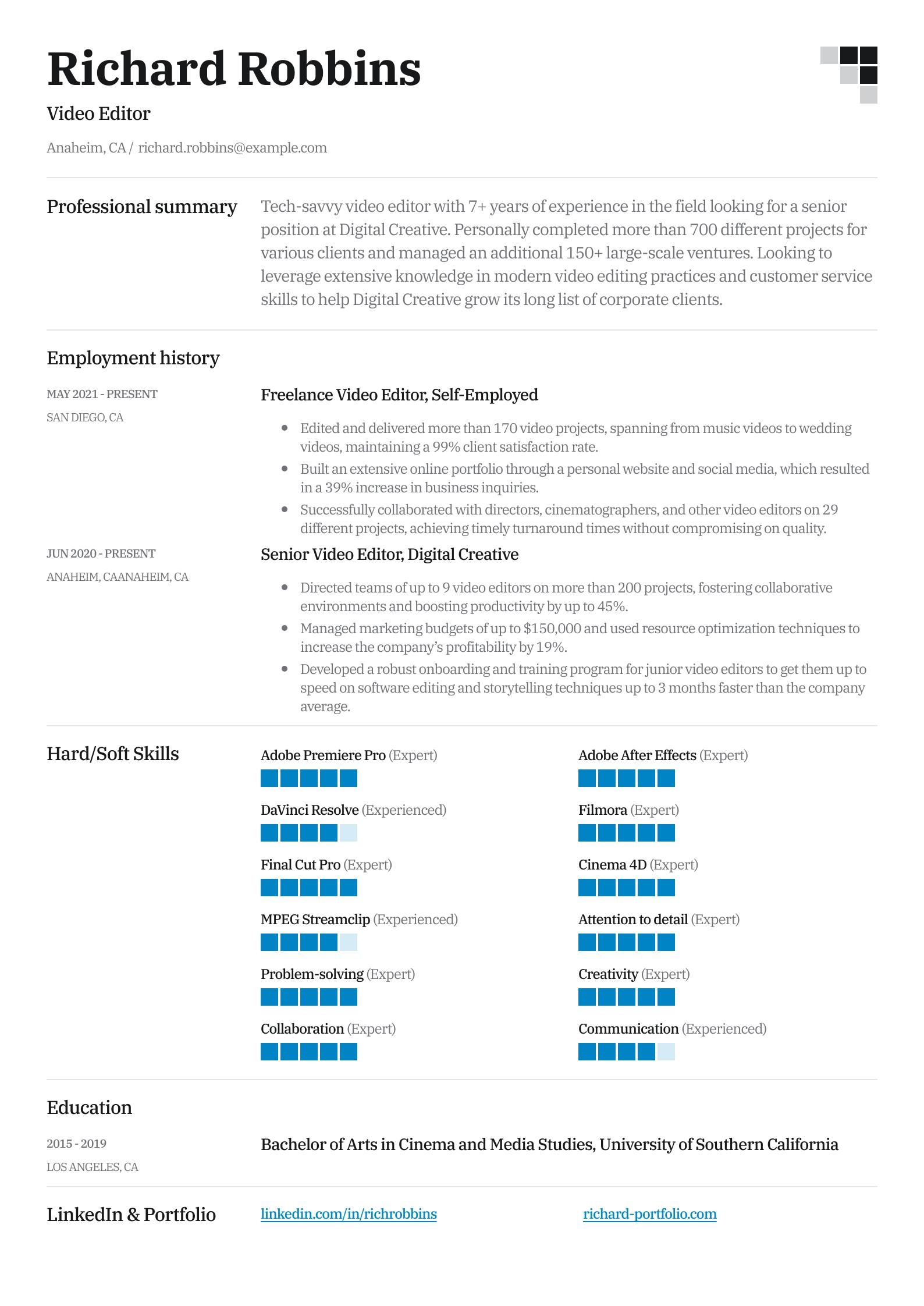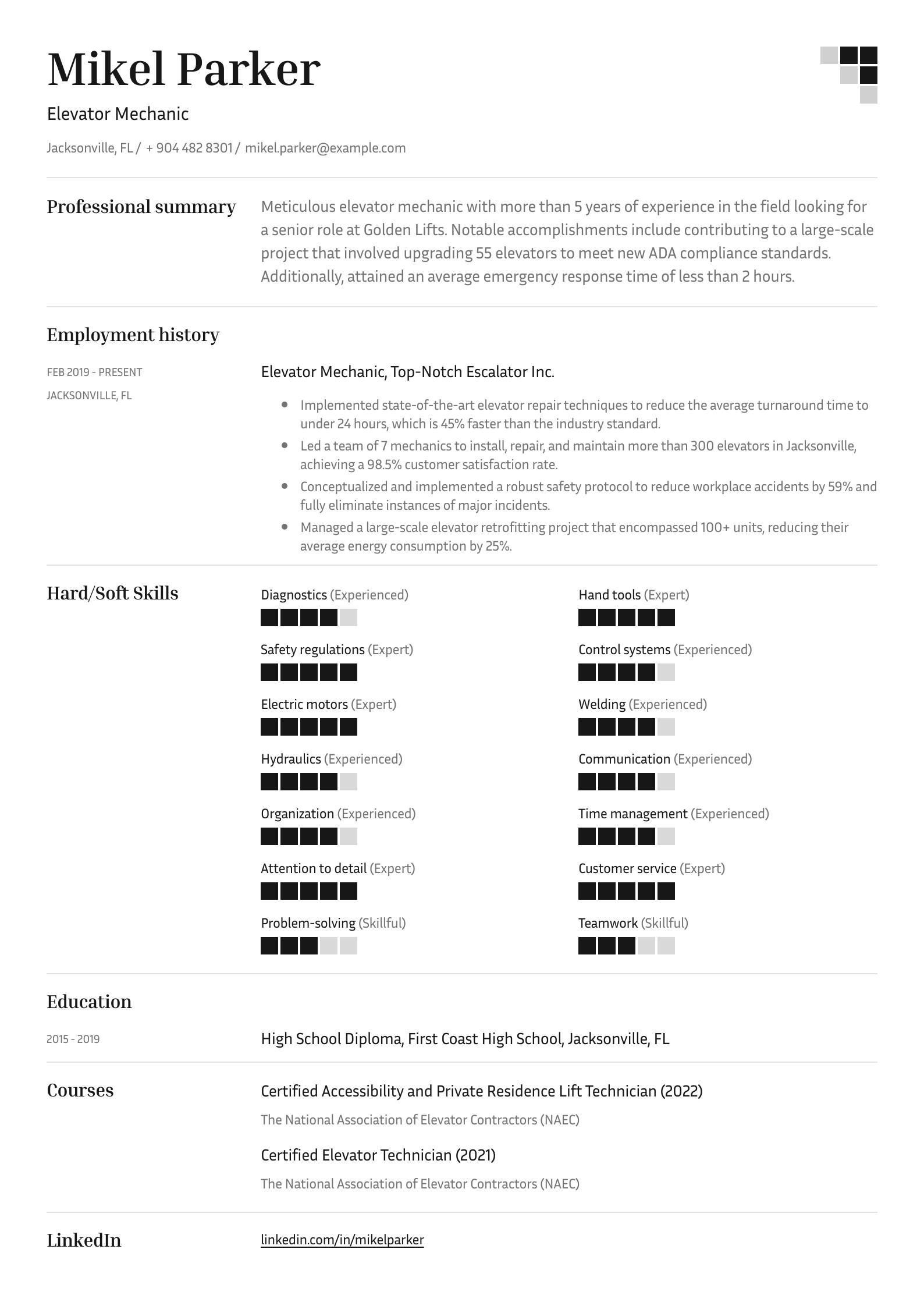How to Create a Professional Resume with Our Examples
Here’s a step-by-step guide on how to use our free resume examples to create an outstanding document on your own.
Step 1: Choose a resume example based on your industry or experience level
Your resume’s design and writing style should reflect the industry you’re in and the amount of work experience you have.
For instance, fashion resume examples can help you emphasize your artistic acumen and fashion designer skills, while customer service resume examples help convey interpersonal prowess and customer service skills.
Step 2: Personalize the content to reflect your skills and achievements
The sections and information you include in your resume should concisely and professionally showcase your skills and achievements most relevant to the role you’re after. The contents of your resume should be perfectly tailored to display the qualifications you know recruiters are looking for.
Step 3: Use action verbs and quantifiable results to make your resume stand out
Incorporate action verbs and power words to make your writing stand out and be more memorable. Moreover, use numbers and statistics when describing your achievements to add measurable value to them and to validate your competence.
Step 4: Format and proofread your resume for errors
Use formats like chronological, functional, or combination to optimally convey details about your qualifications. Moreover, you want to proofread your resume before submitting it to ensure there are no typos or mistakes. That way, you’re demonstrating professionalism, diligence, and attention to detail.
How to Pick the Best Resume Template
Picking the best resume template for your needs involves a careful consideration of several key factors. Let’s see what they are.
#1. Select Your Industry and Career Level
Choosing a template that best matches your field of work and career level will perfectly demonstrate your competence and qualifications relevant to the position you’re applying for. That’s why our resume templates cover countless industries and are designed for entry-level professionals and seasoned veterans alike.
#2. Choose The Right Resume Format
The right resume format will emphasize your key strengths and help you present yourself as the most suitable candidate.
For instance, the chronological format is perfect for job seekers with a steady work history, the functional format is tailored toward entry-level professionals with no experience, and the combination format works well for those with lots of experience but with employment gaps.
#3. Make Sure It’s ATS Compatible
Ensuring that you’ve picked an ATS-friendly resume template helps you pass the initial software screening companies use to filter through candidates. Our professional resume templates and examples are built for the ATS, so you don’t have to worry about doing anything more to pass the scan.
However, you can always further improve your chances with screening software by incorporating keywords (e.g., job title and skills) into your resume that you can typically find in the job ad.
#4. Decide on How to Customize It
The design of resume templates isn’t set in stone, and you can customize them to your needs and liking. With our resume builder, you can effortlessly add resume sections and content or remove the parts that you don’t need. That way, you can craft a unique document tailored to the specific role you’re after.
#5. Don’t Forget About the Visual Appeal
The visual appeal and the design of your resume are essential in grabbing the recruiter’s attention and improving the legibility of your resume. That’s why it’s vital for a resume template to have a clean and professional layout.
Even if you’re looking for design or media and production resume examples, you should pick templates with elegant layouts. The main focus should be on the content of your resume. Visual elements and style should only support the writing, not be the primary aspect of the document.
#6. Consider Industry Standards
Certain industries have strict standards when it comes to creating business correspondence and documents—resumes included. You should take these standards into account when selecting a resume template.
For instance, choosing an overly designed template with colorful elements and stylized fonts for industries like law and finance can indicate a lack of understanding of those fields.
#7. The Number of Pages
The length of your resume is critical. The vast majority of professional resumes should be one page long. Unless you have decades of experience or the job ad requires your resume to be two pages or more, you want to pick a resume template that neatly fits all the mandatory and optional sections on one page.
How to Decide on a Format for Your Resume?
Let’s explore the three most common resume formats. By learning their strengths and characteristics, you’ll know which one is best suited for your needs.
#1. Functional Format
The functional resume format is a skill-centered format designed for entry-level resumes and professionals who have a modest professional history and few notable accomplishments.
It puts the skills section as the main one, helping recent graduates and those who are starting their careers highlight their key strengths. That is a great way of emphasizing your qualifications, demonstrating your potential, and remaining competitive even compared to candidates with more work experience.
#2. Reverse-Chronological Format
The reverse-chronological resume format is the most common format in today’s professional landscape. It lists your past jobs in the reverse-chronological order, starting with your most recent employment. Most of the resume examples are in this format, as well.
This arrangement gives recruiters a clear insight into your career’s progress. As a result, they can quickly gauge your competence and experience, effortlessly determining whether you’re a suitable candidate for a position in their organization.
Another perk of this resume format is that, due to its prevalence, most screening software is set up with it in mind. That’s why the reverse-chronological format is the safest bet when looking to design an ATS-friendly resume.
#3. Hybrid Format
The hybrid (combination) resume format combines the aspects of the previous two formats. It puts your skills as the main section, but it backs up each skill with a list of professional achievements in the reverse-chronological order.
That makes the combination format perfect for experienced candidates who have employment gaps or are changing careers. By shifting the focus from your career progress to your abilities and achievements, the format portrays you as a capable candidate while minimizing the emphasis on gaps in your employment history.
Benefits of Using Pre-Made Resume Examples
Here are four additional benefits to using pre-made resume examples in addition to all the perks and characteristics we’ve outlined already:
Top Benefits of Resume Examples
Inspiration. Resume samples and templates can give you much-needed inspiration and ideas when crafting your document. They can help you position the sections of your resume, emphasize your skills, highlight your achievements, and present the information clearly.
Simplification. Pre-made resume examples give you a clear starting point if you don’t know how to begin writing your resume. They can significantly reduce the stress and the feeling of being overwhelmed by starting from scratch, wondering whether to add your photo, address, LinkedIn, degrees, certifications, and so on.
Consistency. The best resume examples are made by industry professionals and design experts, ensuring consistent formatting and composition. By using them as guidance, you’ll avoid making mistakes like inconsistent font size or uneven spacing with your resume.
Budget-friendliness. Some of the best resume samples you can find are available for free. They are great if you’re on a budget and don’t have money to spare for professional resume-building services or premium software.
Additional Tools to Use to Enhance Your Resume and Job Hunting Experience
In addition to free resume examples and CV templates, we offer several other helpful tools you can use to improve your job-hunting experience and increase your chances of landing the job. Let’s see what they are.
#1. Resume Builder Tool
Our resume builder for job seekers is a state-of-the-art software solution that you can use to create the perfect resume in minutes.
The process is simple, and it goes as follows:
Resume Builder Steps
Pick a resume template that suits your needs.
Input your information in predesignated spots.
Customize the layout and sections to your liking.
Download a finished product in minutes.
The tool is intuitive and user-friendly, so you don’t need prior experience to write your resume with it. Plus, it has an AI helper, which you can use to improve your writing and enhance the outcome.
#2. Cover Letter Examples
We have over 70 cover letter examples to go with your resume, which you can use to further impress recruiters. Writing and submitting a cover letter shows motivation and willingness to go the extra mile, helping you get ahead of the competition.
To make the crafting process significantly easier, you can use our cover letter creator. It will help you save a lot of time and avoid making common cover letter mistakes.
Moreover, our cover letter examples are made to match our professional resumes. That way, you’ll end up with a cohesive package that demonstrates professionalism and attention to detail.
#3. Career Resources
Lastly, our blog offers plenty of free career resources to teach you how to get the most out of your resume, cover letter, CV, job interview, and more. You’re welcome to use it to learn everything from how to answer the most common interview questions to how to format a CV and how to write an application letter.
5 Mistakes to Avoid on Your Resume
Here are the biggest and most common mistakes to avoid when writing your resume so it doesn’t get rejected:
Resume Mistakes
Typos and inaccuracies. Your resume should be spotless to convey professionalism, care, and attention to detail. That’s why it’s crucial to meticulously proofread it before submission. You can also ask a friend or a mentor to give it another look and help you spot the mistakes.
Irrelevant information. A resume should be concise and strictly related to the role you’re applying for. Adding unrelated details, whether skills, accomplishments, or past employment, detracts from your important qualifications and lowers the quality of your resume.
Generic content. You should always tailor your resume to the role you’re applying for. Submitting a generic resume every single time shows a lack of effort and usually doesn’t highlight all the relevant qualifications.
Unprofessional contact information. Avoid adding email addresses like “partylover123@email.com.” If you still have an unprofessional email, you should create a new one with a format along the lines of “firstname.lastname@email.com.”
Poor format and layout. The design and organization of your resume should be clean and consistent to enhance its readability. That’s why you want a good font for your resume, consistent margin size and line spacing, and sufficient white space between sections.
To give you an idea of what happens when you make these mistakes, here are some bad resume examples.
Resume Examples FAQ
Yes, these resume examples are 100% free. You can use them for inspiration or to learn how to write your own document from scratch. By following our resume examples as guides, you’ll craft a professional document that is clean, elegant, and ATS-compliant.
Employers mainly look for work experience in a resume. On top of that, they look for skills relevant to the job, a candidate’s education and certifications, and any optional qualifications that could help them perform better.
In most cases, you should use the reverse-chronological format for your resume. If you’re an entry-level candidate, you can use the functional format to emphasize your skills, and if you have long employment gaps, you can take advantage of the hybrid format.
Your resume should be one page long in the majority of cases. You should only go for two or more pages if the job ad requires it or you have decades of relevant professional experience.
Yes, you should send a different resume every time you apply for a different job. This allows you to tailor the document to highlight the specific skills and experiences recruiters are looking for, maximizing your chances of impressing them and securing a job interview.
You should match your cover letter with your resume to create a cohesive application package. This helps you leave a lasting good impression on recruiters and demonstrate professionalism and attention to detail.
If you can’t find a resume example of your job, you should take a look at examples for similar jobs or industries. For instance, if you can’t find an example for an accounting resume, you can look for financial analyst or manager resume examples.
To write a simple resume, you can follow a professional resume example that contains all the necessary sections, an established format, and a clean layout. This will help you include all the essential information without overcomplicating the document.
You should list as many jobs as you have that are relevant to the role you’re applying for. Prioritize recent employment and impressive accomplishments. Jobs you had a long time ago are less relevant and should be omitted if you don’t have enough space on your resume.
Yes, you are allowed to use resume templates when applying for a job. Recruiters don’t care whether you’ve used a template or an example as long as it properly conveys information about your skills and qualifications.
Most of these resumes are compatible with ATS systems. All of the reverse-chronological resume examples and templates are built from the ground up to be ATS-friendly. However, functional resumes might not be compatible with every ATS system.
Yes, you can edit resume examples and use them as templates when writing your own. Resume examples are great starting points as they are preformatted and come with professional layouts, so all you need to do is swap the information with your details.
We have over 70 cover letter examples for numerous jobs and industries, perfect for professionals of all experience levels. If you need a cover letter with your resume, you can use our examples for inspiration or as templates.


